Overview
Understanding the criteria and application process for VA diabetes ratings is crucial for veterans seeking disability benefits related to diabetes. We recognize that navigating this process can be overwhelming. This article aims to provide clarity and support.
It outlines the different types of diabetes and their impacts on veterans' health. Each condition can vary in severity, and knowing the rating criteria is essential for determining eligibility. We understand that the details can be complex, but thorough documentation and effective management of your condition can significantly enhance your chances of receiving benefits.
We’re here to help you through each step of the application process. By emphasizing the importance of accurate information and supportive management, we hope to empower you on this journey. Remember, you are not alone in this process, and there are resources available to assist you.
Introduction
Understanding diabetes is crucial for veterans. This chronic condition can significantly impact health and quality of life. We recognize that many former service members are grappling with diabetes, making it essential to explore the various types and their implications for health management and VA ratings.
What challenges do veterans face in navigating the complexities of diabetes? How can they leverage their understanding of this condition to enhance their eligibility for benefits?
This article delves into the intricacies of diabetes types, their effects on veterans, and the essential steps to successfully apply for VA diabetes ratings.
Remember, you are not alone in this journey, and we're here to help.
Define Diabetes and Its Types
Diabetes is a chronic illness that affects many, defined by the body's struggle to regulate blood sugar levels effectively. For our veterans, understanding this condition is crucial, as it can significantly impact their health and well-being. Let's explore the most common types of diabetes that veterans may face:
-
Type 1 Diabetes: This autoimmune disorder results in the pancreas producing little to no insulin, often starting in childhood or adolescence. Veterans with Type 1 diabetes may encounter unique challenges in managing their health, particularly when it comes to accessing essential medical supplies and support.
-
Type 2 Diabetes: As the most prevalent form, Type 2 diabetes is often linked to obesity and lifestyle choices. In this case, the body either becomes resistant to insulin or does not produce enough. Research indicates that nearly 25% of former military personnel receiving VA care have high blood sugar, with Type 2 being the most common. It's important to recognize that poorly managed A1C levels can lead to increased risks of hospitalization and complications, especially during critical times like the COVID-19 pandemic.
-
Gestational Diabetes: This type occurs during pregnancy and typically resolves after childbirth. However, it can increase the risk of developing diabetes later in life, making it essential for service members to monitor their health after pregnancy.
Understanding these types of blood sugar conditions is vital for former service members, as it directly impacts their treatment options and eligibility for VA diabetes ratings. For instance, those with service-related diabetes may qualify for disability benefits based on the VA diabetes ratings, providing crucial support for managing their health. Remember, effective blood sugar control is key to enhancing your quality of life and preventing serious complications, especially within our military community. You're not alone in this journey; we're here to help you navigate these challenges with compassion and care.
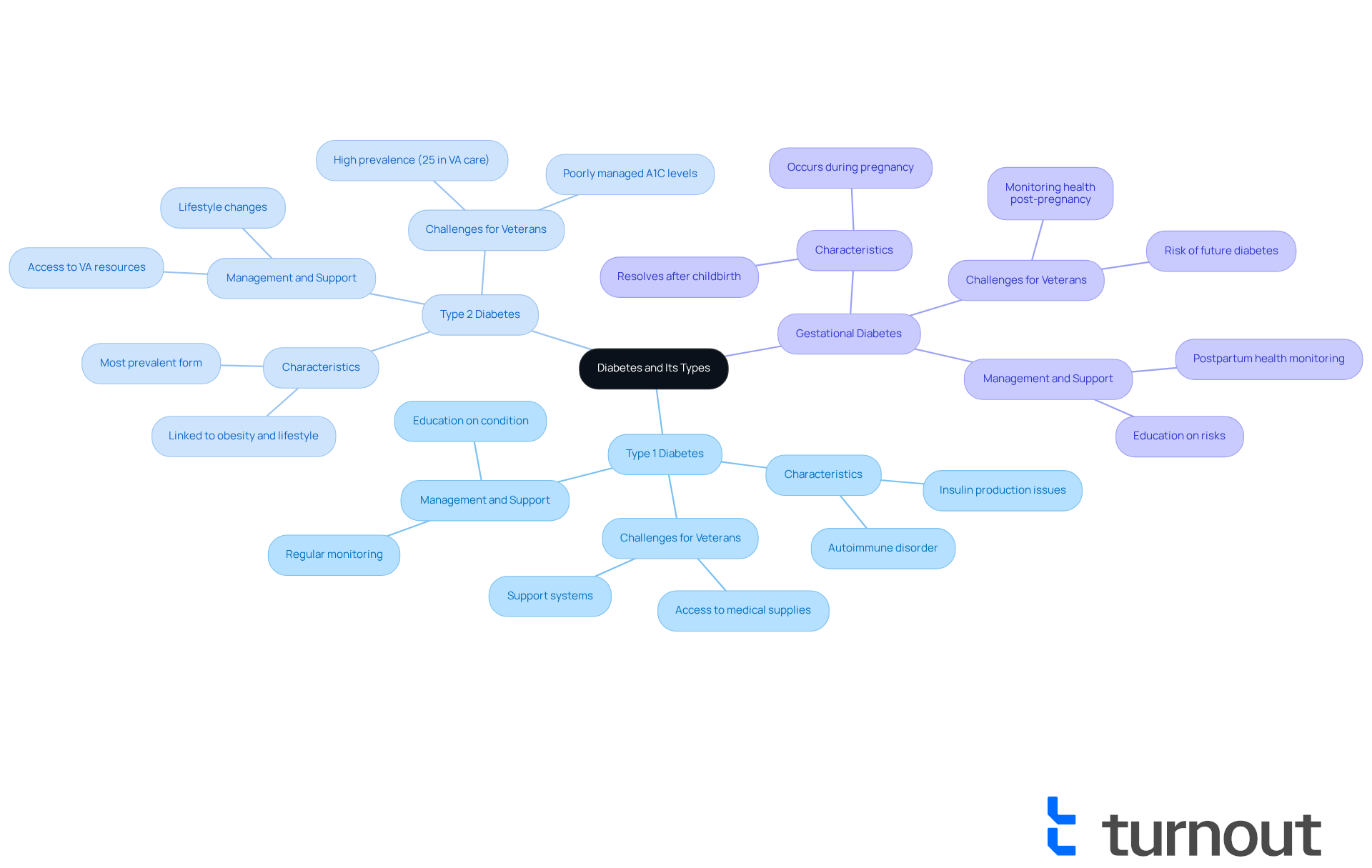
Explore Diabetes Effects on Veterans
Diabetes profoundly impacts veterans' health and overall quality of life, affecting several critical areas.
Increased Risk of Complications: Veterans with diabetes face heightened risks for serious health issues, including cardiovascular diseases, neuropathy, kidney damage, and vision problems. It's concerning to note that nearly 25% of former military personnel are affected by this condition—more than double the percentage in the general population. This highlights the urgent need for effective management.
Mental Well-being Issues: We understand that managing a chronic illness can lead to significant mental health challenges, such as anxiety and depression. In fact, depression occurs twice as often in individuals with high blood sugar levels. Many veterans express feeling overwhelmed by the demands of their condition, which can exacerbate pre-existing service-related mental health issues. The stress of managing blood sugar levels often leads to neglecting daily glucose monitoring and reduced physical activity, complicating their overall health.
Lifestyle Adjustments: It's common to feel daunted by the substantial changes needed in diet, exercise, and daily routines to manage diabetes effectively. These adjustments can be particularly challenging when combined with the emotional toll of service-related disabilities. Many former service members share their struggles in maintaining these lifestyle changes amidst daily life challenges. For instance, they often find it difficult to adhere to new dietary guidelines while coping with stress.
Moreover, tools like the My HealtheVet platform can support veterans in monitoring their wellness metrics and managing blood sugar levels effectively. Understanding these impacts is crucial for promoting well-being and accessing the benefits veterans are entitled to. By recognizing the link between blood sugar issues and mental well-being, veterans can better navigate the challenges they face and seek the assistance they need. Remember, you are not alone in this journey, and we're here to help.
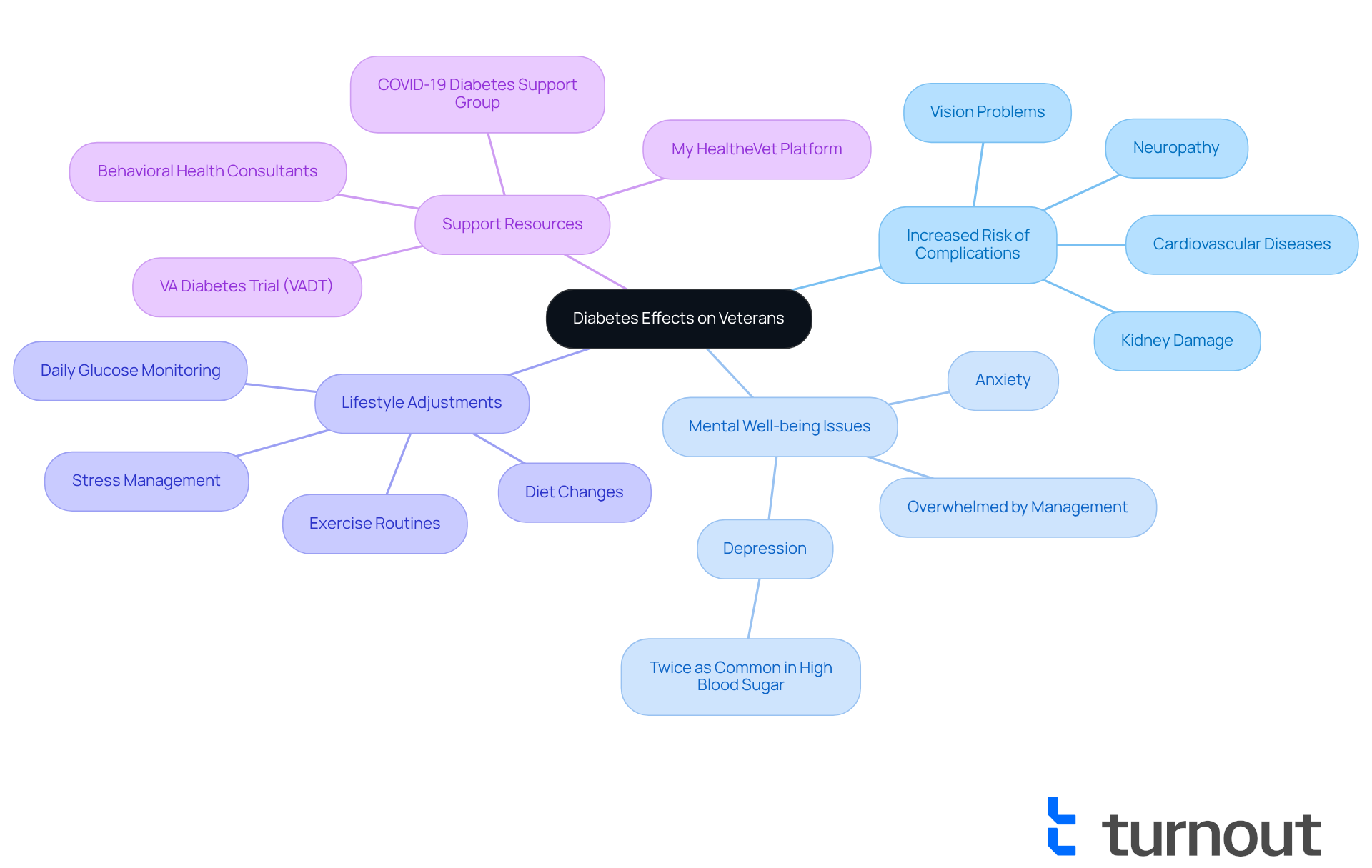
Understand the VA Rating Criteria for Diabetes
Navigating the challenges of blood sugar disorders can be overwhelming, and we understand that many veterans face unique struggles in managing their health. The VA allocates va diabetes ratings based on the severity of these conditions and the specific management needs required. Here’s a breakdown of the ratings:
- 10%: Manageable by a restricted diet only.
- 20%: Requires insulin or oral medication and a restricted diet.
- 40%: Requires insulin, a restricted diet, and regulation of activities to prevent complications.
- 60%: Requires insulin, a restricted diet, and frequent hospitalizations or regular visits to a diabetic care provider.
- 100%: Requires multiple daily injections of insulin, a restricted diet, and regulation of activities, along with severe complications that necessitate frequent medical attention.
Understanding the va diabetes ratings criteria is essential for veterans to accurately represent their condition in claims. You are not alone in this journey; we're here to help you navigate these complexities and ensure you receive the support you deserve.
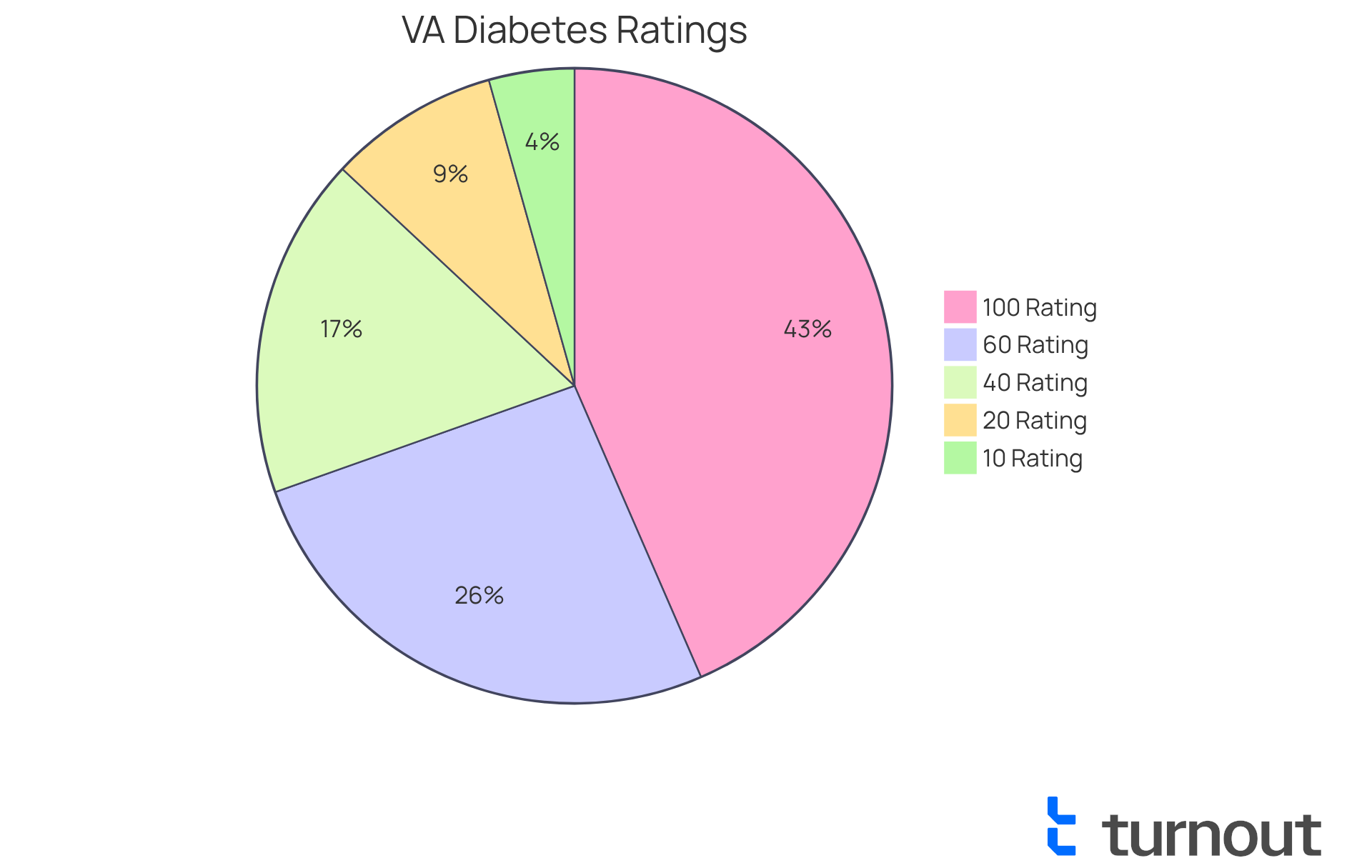
Navigate the Application Process for VA Diabetes Ratings
Applying for VA diabetes ratings for disability benefits can feel overwhelming, but we're here to help you navigate this journey. Follow these compassionate steps to ensure a smoother process:
-
Gather Documentation: Start by collecting comprehensive medical records, service records, and any evidence that supports your claim. This includes documentation of how your condition impacts your daily life and any complications you may have encountered. Statements from family and fellow servicemembers can also be invaluable in supporting your claim.
-
Complete the Application: Use VA Form 21-526EZ to apply for disability compensation. Make sure all sections are filled out accurately to avoid delays in processing. We understand that this can be a tedious task, but attention to detail is crucial.
-
Submit Your Claim: You have several options for submission—online, by mail, or in person at a VA regional office. If you choose to submit by mail, send your application to the Department of Veterans Affairs Claims Intake Center in Janesville, WI. Remember, every step you take brings you closer to the benefits you deserve.
-
Attend a Compensation and Pension Exam: The VA may require an exam to assess the severity of your diabetes and its impact on your health. Attending this exam is essential to avoid delays in your claim. It’s common to feel anxious about this, but know that it’s a standard part of the process.
-
Follow Up: Keep track of your application status and respond promptly to any requests for additional information. The average time to complete disability-related claims is currently around 100.4 days, so staying proactive can help expedite the process. You are not alone in this; many veterans have successfully navigated this path.
Veterans have shared their experiences of successfully navigating this process. One individual emphasized the significance of collecting comprehensive medical records, which eventually led to a positive outcome for their claim. Another expressed gratitude for the support received during the application process, highlighting how meticulous preparation made a considerable impact.
Recent modifications in the VA application procedure for VA diabetes ratings have simplified specific elements, making it easier for former military personnel to access benefits. Additionally, former service members whose diabetic condition has worsened since a prior VA disability rating can seek reevaluation. By understanding the criteria and following these steps, you can enhance your chances of a successful claim. Remember, we’re here to support you every step of the way.
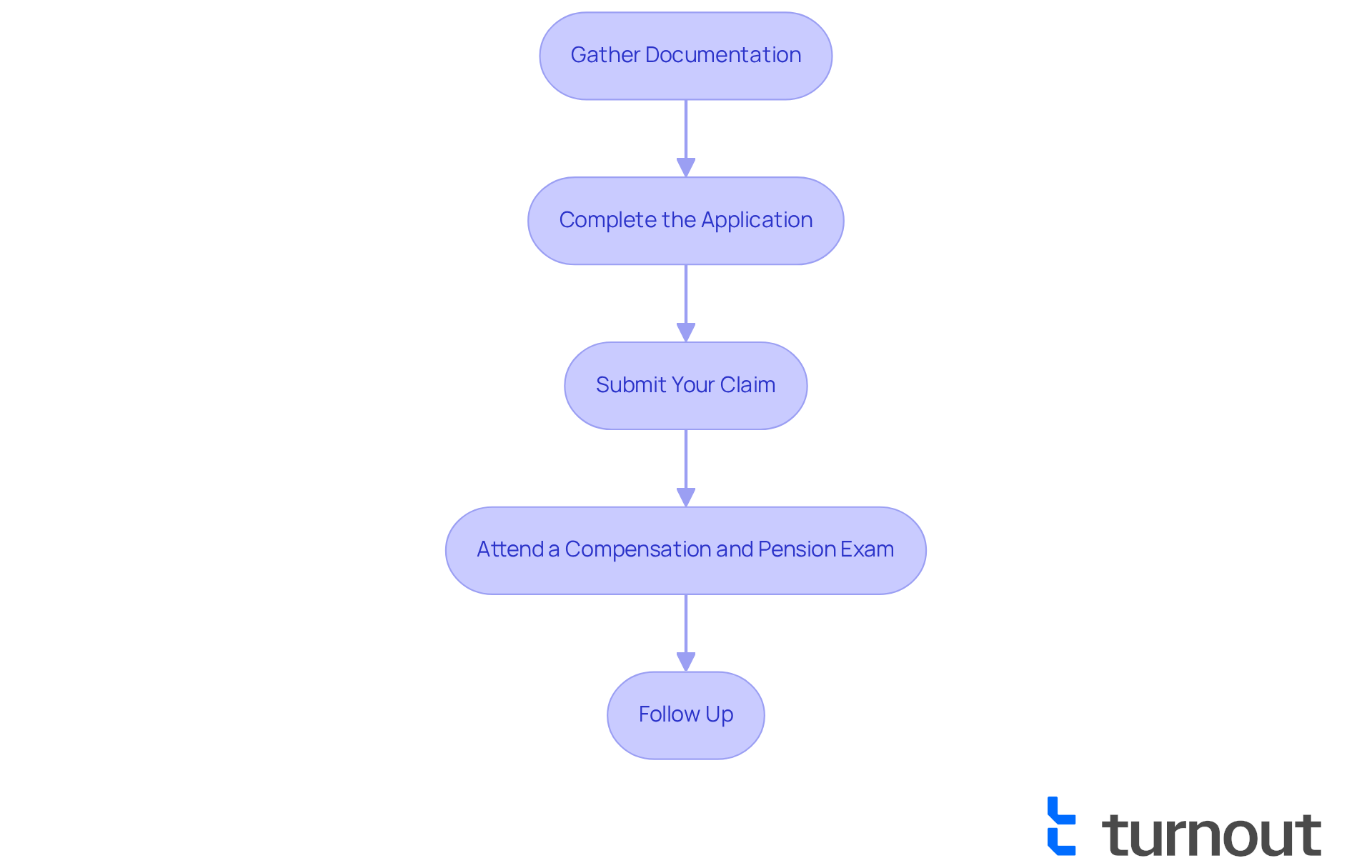
Manage Diabetes to Influence VA Ratings
Efficient oversight of blood sugar levels is essential for veterans to sustain their well-being and may affect their VA diabetes ratings. We understand that managing diabetes can be challenging, but there are effective strategies to help you navigate this journey:
- Regular Monitoring: Consistently tracking blood sugar levels is vital for understanding how various foods and activities impact diabetes management. This proactive strategy can lead to improved wellness outcomes. The VA's 'Understand Your Diabetes Numbers' campaign highlights the importance of monitoring these essential wellness measurements.
- Healthy Eating: Following a balanced diet rich in whole grains, lean proteins, and plenty of fruits and vegetables—while avoiding processed sugars—is crucial. Engaging in programs like the Virta program can significantly aid in dietary management; nearly 60% of participants successfully reversed their diabetes within a year.
- Physical Activity: Participating in consistent exercise not only helps in managing blood sugar levels but also enhances overall well-being. It's common to feel overwhelmed, but research indicates that former service members who integrate physical activity into their routines experience better wellness metrics.
- Medication Adherence: Taking prescribed medications as directed is critical. Veterans should consult healthcare providers regarding any changes in their condition to ensure optimal management of their health.
- Education and Support: Engaging in health education programs and seeking assistance from healthcare professionals and peer groups can empower you to take control of your well-being. Dr. Avian Milton, a clinical pharmacy provider at North Texas VA, emphasizes, "it’s important that our patients have a correct expectation of self-management for their condition to achieve the best outcomes."
By actively managing your condition, you can enhance your quality of life and potentially improve your eligibility for higher VA diabetes ratings. Remember, you are not alone in this journey. The VA provides diabetes management services, including diet counseling and telehealth options, which are crucial resources for veterans navigating their health challenges. We're here to help you every step of the way.
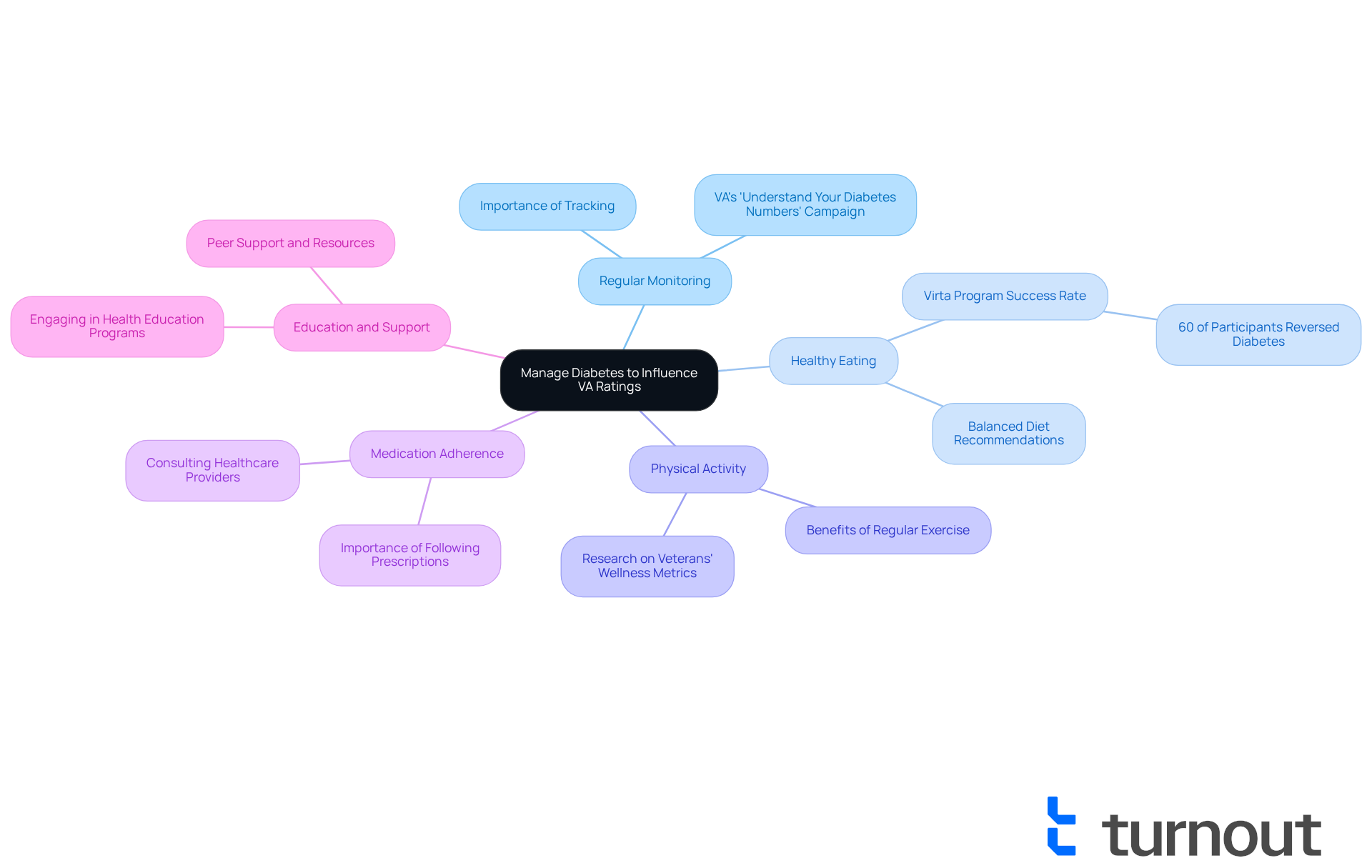
Conclusion
Understanding diabetes and its implications for veterans is essential for ensuring they receive the support and benefits they deserve. This article delves into the various types of diabetes, their effects on health and mental well-being, and the significance of VA ratings. By grasping the criteria for these ratings and the application process, veterans can better navigate their path to securing necessary disability benefits.
Key insights include the distinct challenges posed by Type 1 and Type 2 diabetes, particularly in the veteran community, where the prevalence of diabetes is notably high. We understand that managing diabetes can be overwhelming, but effective strategies—such as regular monitoring, healthy eating, and physical activity—can enhance overall health and positively influence VA ratings. Furthermore, we outline a clear step-by-step approach to applying for VA diabetes benefits, emphasizing the importance of thorough documentation and follow-up.
Ultimately, the journey to managing diabetes and accessing VA benefits is not one that veterans need to undertake alone. By actively engaging in their health management and utilizing available resources, veterans can improve their quality of life and navigate the complexities of the VA system more effectively. Remember, you are not alone in this journey. The importance of understanding diabetes within the context of veteran care cannot be overstated, as it empowers individuals to take control of their health and secure the benefits they have earned through their service.
Frequently Asked Questions
What is diabetes and how does it affect veterans?
Diabetes is a chronic illness characterized by the body's difficulty in regulating blood sugar levels. For veterans, understanding diabetes is crucial as it can significantly impact their health and well-being.
What are the main types of diabetes that veterans may face?
The main types of diabetes that veterans may encounter are: Type 1 Diabetes: An autoimmune disorder where the pancreas produces little to no insulin, often beginning in childhood or adolescence. Type 2 Diabetes: The most common form, often linked to obesity and lifestyle, where the body becomes resistant to insulin or does not produce enough. Nearly 25% of former military personnel receiving VA care have high blood sugar, with Type 2 being the most prevalent. Gestational Diabetes: Occurs during pregnancy and usually resolves after childbirth but can increase the risk of developing diabetes later in life.
What complications are veterans with diabetes at risk for?
Veterans with diabetes face an increased risk of serious health complications, including cardiovascular diseases, neuropathy, kidney damage, and vision problems. The prevalence of diabetes among former military personnel is more than double that of the general population.
How does diabetes affect the mental well-being of veterans?
Managing diabetes can lead to significant mental health challenges for veterans, such as anxiety and depression. Depression is reported to occur twice as often in individuals with high blood sugar levels, and the stress of managing diabetes can exacerbate pre-existing mental health issues.
What lifestyle adjustments do veterans need to make to manage diabetes effectively?
Veterans may need to make substantial changes to their diet, exercise, and daily routines to manage diabetes effectively. These adjustments can be challenging, especially when combined with the emotional toll of service-related disabilities.
What resources are available to help veterans manage their diabetes?
Tools like the My HealtheVet platform can assist veterans in monitoring their wellness metrics and managing their blood sugar levels effectively. Understanding the impacts of diabetes is crucial for promoting well-being and accessing benefits.
How can veterans navigate the challenges associated with diabetes?
By recognizing the connection between blood sugar issues and mental well-being, veterans can better navigate the challenges they face. Seeking assistance and support is essential, and veterans are encouraged to know they are not alone in this journey.




